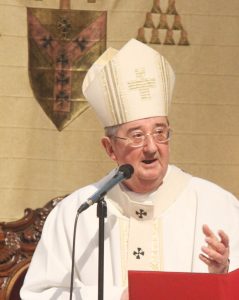
By Cian Molloy - 02 April, 2018

Archbishop Diarmuid Martin delivering his Easter Sunday homily (Pic John McElroy).
In today’s secularised society many people have a relationship to God that is fragile and tenuous, but His call still reaches out to every generation, said Archbishop Diarmuid Martin of Dublin in his Easter Sunday homily.
“More and more people feel that they can live their daily lives without any direct reference to God,” said the Archbishop, celebrating Mass in St Mary’s Pro-cathedral. “Many of them will still turn to the Church in special moments in their lives, but their relationship to God is fragile and tenuous.”
Secularisation is not just about a fall in Mass attendance or weaker attachment of individuals to their faith, he said, nor is it about a political or media bias against the Church.
“Where the overall presence of God in society diminishes or becomes relativised, then society as a whole begins to ask itself if God really matters at all,” Dr Martin said. “If society goes about its business without God really mattering, then the overall place of faith in society changes.
“When the language of faith and the overall language of a society become more separated from each other, the danger arises that the men and women of that society do not have a language that opens them to God or helps them find Jesus in their lives.”
However, this is not a uniquely new problem, said the Archbishop. “Our society is probably no worse than others. The history of salvation is a complex history of acceptance and reception. It is a story of God’s people living often in exile, in an alien place and under persecution. The people rebel and refuse and reject their God and create false gods. It is, however, God himself who intervenes and his call reaches out in every generation to a people willing to return to him in fidelity and hope.
“The story of the history of salvation is the story of the Church, of God’s people renewed in each new generation. Today still it is in the Church that we encounter the saving power of Jesus.”
However, Dr Martin acknowledged that there were many who proclaim that they “believe in God but not in the Church” and the best response to that can be found in the history of salvation, where “the resurrection is not just a distant memory, an event entirely of the past”.
The Risen Lord is among us, he said. “Christians are resurrection people. We are people of life and hope, people who understand that only a future filled with the hope of Jesus Christ will lead us and our society to true future.
“The Church must always be pro-life, scrupulously respecting the dignity of every human life at every stage of its existence. The Church must also be a pointer to what life means, to what sustains rather than degrades life.
“Easter is the celebration of resurrection and life as a hope for those who otherwise would have no hope. Jesus is to be found where his care is present with those who are marginalised in life, where people cannot achieve what life should open for them, through exclusion, homelessness, oppression, and a culture of emptiness and exploitation.
“The Church must be a beacon of hope, translating the teaching of Jesus into concrete help and support for those for whom the burdens of life can be so great as to empty their hearts of hope. Jesus is risen and is with us and helps us to be people of life and light in a time marked by many dimensions of darkness.”